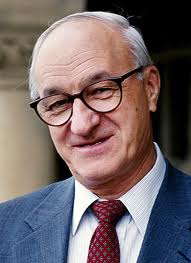- Canadian, born in northern Alberta
- Behaviourism theory of the time stated that one’s environment causes one’s behaviour

- Bandura agreed that environment causes behaviour, but he also believed that behaviour causes environment – he labelled this “reciprocal determinism” – that the world and a person’s behaviour cause each other
- He studied personality as it interacted with environment, behaviour and a person’s psychological processes
Famous Bobo Doll Study:
- A film was taken of one of his students beating up a bobo doll ( an inflatable egg-shaped balloon with a weighted bottom that makes it bob back up when knocked over – Bobo the clown)
- The student punched the clown, kicked it, sat on it, hit it with a hammer, yelled at it etc.
- The film was shown to kindergarten students – they liked it
- They were let out to play – in the playroom was a new bobo doll, hammers etc, and observers
- The kids beat the bobo doll, imitated the woman in the film, kicked, punched, shouted at it, etc.
- The children changed their behaviour – called “observational learning” or “modelling”
- Bandura varied the situation and this allowed him to identify the steps in the modelling process:
- Attention – one has to pay attention to learn anything – things that put a damper on attention decrease learning (sleepy, drugs, sick etc.) – if a model is colourful and attractive, one pays more attention to it (ie. TV and effect on kids)
- Retention – must retain and remember what you have paid attention to
- Reproduction – reproduce behaviour – the ability to imitate improves with practice and when we imagine ourselves performing
- Motivation – one must be motivated to imitate (reinforcement) – negative motivation (punishment) is reason not to imitate
- Self regulation – controlling one’s own behaviour is an important part of human personaliy
- 3 steps i) self observation – keeps tabs on own behaviour, being aware of what
you are doing
ii) judgement – compare own behaviour with the standard
iii) self – response – one rewards or punishes self in comparison with the
standard
-
- This results in self esteem being positive (meeting standards and rewarding self ) or negative (failing to meet standards and punishing self)
- Bandura’s theory has made the public and political affairs realize that violence causes aggression in children.
